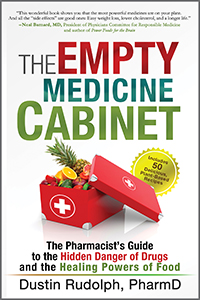BOOK REVIEW: The Empty Medicine Cabinet

You're in line at your local pharmacy with a splitting headache, a runny nose, aching joints... and you're not even there for you. You are picking up Metformin to help control your mom's A1C level, and to refill your dad's Lipitor to bring his cholesterol down. Mom was diagnosed with Type II Diabetes four years ago, dad got his cardiovascular disease diagnosis not too long after, and you... you with three kids at home, your husband and you working like mad to keep up are at wits end all the while you are throwing money at your pharmacist and the drive-thru.
What if by the time you got up to the head of the line, and as the pharmacist is pulling your orders out of the bins, he hands you information that tells you how a plant based diet has proven to be successful in reversing both your mom and your dad's disease? You'd think he was nuts, right? He mentions that the last three times he's seen you, you've been suffering from that cold (has it been THAT long??) and eating the right foods may knock that right out. You love this guy, he's been your family pharmacist for as long as your can remember, but this wacky information on how food can reverse a chronic illness such as heart disease is a little out there, and, why would a pharmacist of all people, try to sell plants over pills??
You smile, thank him, grab your meds and go about your day.
Sound familiar (sans the whole pharmacist interlude that is)?
Enter Dustin Rudolph, PharmD. A pharmacist for many years, Rudolph built up a constant flow of "regulars". Over the course of time he saw the progression of medications dosed, then more medications to help alleviate the side effects of the initial prescriptions and then more meds to alleviate the side effects of the side effects of the second round of meds given. This was maddening and also heartbreaking; watching the people he was becoming close to fail in health. Something had to be done.
Rudolph loves his job, adores his clients and has the utmost respect for Western Medicine, however, he has researched the effects of food as medicine and his book written from the perspective of a pharmacist offers great insight on not only why sometimes (a lot of the time??) good food choices are the better choice, but also these prescriptions, if taken too long, can lead to the deterioration and sometimes demise of our health. He's not negating your physicians orders, he's simply out to educate his clients, their families...and their doctors.
THE REVIEW:
He opens up with talk on macronutrients; what they are, where to find them and why they are so advantageous to our health. We obsess over the macros: fat, carbs and proteins, however Rudolph explains that if we concentrate more on the micros ("the calorie free portion of food that consists of the following: vitamins, minerals, antioxidants and thousands of phytochemicals. Micronutrients are vital for growth and development. These nutrients also play a key role in maintaining an ideal body weight as well") we will get all the macronutrients our bodies need to flourish. He provides easy examples of the micros and you won't be surprised where you will find them in your local market.
After laying down the foundation for good health, Rudolph then goes chapter by chapter through the top chronic illnesses we suffer from in modern day. The #1 killer in the United States, chapter three focuses on heart disease. He briefly, yet comprehensively goes through how the disease develops, the anatomy of an artery and how it is damaged by poor food choices, the formation of plaque, the risks of bypass surgery, the famous Caldwell Esselstyn, Jr., MD Heart Study and the eye opening revelation that statins DO NOT benefit most patients.
Diabetes is addressed next with a very easy explanation of what Type II is and how it manifests. To my surprise he got into the topic of intramyocellular lipid (IMCL) which I learned about many years ago in my training under Dr. Neal Barnard at the Physicians Committee for Responsible Medicine in Washington DC. I have not heard many doctors talk about this and the role it plays. Additionally, I have never heard of anyone with the illness mention it.... and how many people do we know with Type II Diabetes?? Rudolph also offers a list of medications most commonly prescribed to manage the disease which includes the reduction in A1C level and side effects associated. He explains,
"It's hard to win the war on diabetes when the only topic of conversation focuses on insulin resistance. By doing so, we are ignoring the more pressing subjects of IMCLs and decreased mitochondrial biogenesis. This is why mainstream medicine flourishes while doing nothing to dramatically reduce or eliminate this horrific disease."
I'm rarely the person who takes other people's inspirational quotes to heart; I'm on my own journey, we all are, but, when I read Marcia Smith's words that open up the chapter on cancer I was a bit stunned with how quickly my eyes welled up and that spark in my soul ignited.
"Cancer is not a death sentence, but rather it is a life sentence; it pushes one to live."
The illness closest to my heart because it took my dad and then came around to visit me (twice), I give kudos to Rudolph for yes, giving the topic a good amount of real estate, but more so, filling that space with what I believe information is not general knowledge. He touches on the trailblazing whole food plant-based guru, Dr. T. Colin Campbell of the notorious China Study, but he also sites other studies linking nutrition to health. Rudolph continues on to angiogenesis: the formation of new blood vessels from existing ones. He cites Dr. William Li, the founder of the Angiogenesis Foundation, and briefly explains that this process the body can so beautifully perform to grow and heal itself for vitality, can also do much harm as it it also has the ability to feed tumors that begin as benign and transform into malignancy. Antiangiogenic drugs are being tested and will someday take the place of many debilitating chemotherapy treatments, however, in the meantime, researches have found antiangiogenic properties in many of the foods found in our grocery stores. Additionally, these foods don't come with the side effects that the man made pharmaceutical counterparts might. Rudolph rounds out the chapter by mentioning the Moss Reports. Ralph Moss, PhD, is a medical writer who has devoted over 40 years of his career to researching cancer and cancer related therapies. His reports are available on his Cancer Decisions website and can help anyone facing the disease.
Autoimmune diseases are also on the rise. Multiple Sclerosis, Rheumatoid Arthritis, Lupus, Inflammatory Bowel Disease, Colitis, Crohn's and Psoriasis are all some of the illness addressed. As I was reading this chapter, I caught myself smiling as I can recall students in my classes over the years who once suffered from some of these diseases soon found their symptoms alleviated one they adopted a plant-based diet.
A nod to healthy skin, eyes, kidneys and brain (dementia) is included and then he hits behind the scenes of medicine, food and politics.
We've read entire books, collection of books devoted to each of these topics, but Rudolph's keen ability to rifle through what has been said, ad infinitum, and present only the logically deduced point is impressive. He talks briefly about the severe lack of nutritional education in Med School and lists some of the high quality formal training programs that fill that need. These programs are available to physicians, clinicians and the general inquisitive public. Some talk (and resources) on what physicians are receiving payment from big pharma is included, as well as some chatter on lobbying and agriculture. It's eye opening to say the least and it's just enough to get the reader interested and want to begin their own research.
A man after my own heart - in the second half of the book, he presents his own program for implementation of a plant-based diet. This is not ground breaking stuff, however, and as with the first half, I really enjoyed his approach as he not only shows the reader how to transition to the lifestyle, but also why. What's so bad about dairy? - you'll find out. Isn't eating this way boring and expensive? - no. It's good for adults, but not kids, right? - negative. He debunks the myths and even gets no the nitty gritty of gluten.
Several pages of approachable (re: no crazy vegan ingredients) plant-based recipes follow and THE most comprehensive collection of resources I have seen to date in one book wrap up this invaluable project.
###
Dustin, thank you for sharing your knowledge, your compassion and your experience with us. I cannot thank you enough for the privilege of extending a copy of your hard work to me and actually wanting my feedback. I am humbled. Keep going, my friend; we are all hungry for more.

